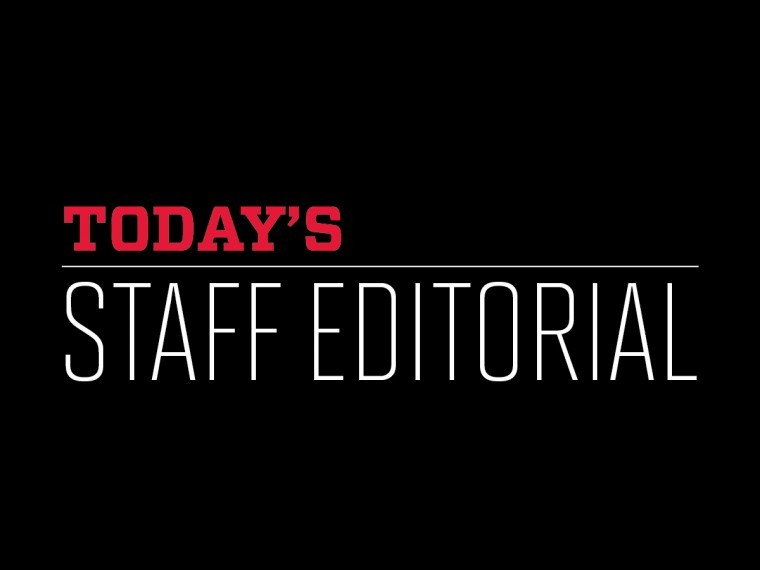
Today’s Staff Editorial
Shocker: A college newspaper is endorsing Barack Obama for president.
We do not, however, walk into this endorsement blindly, nor do we think he is the perfect presidential candidate.
It doesn’t seem like too long ago that young voters were enthused over Obama in 2008. But the president’s gray hairs and the present attitudes of the younger demographic are an indication of how much can change in four years. While Obama has a comfortable margin of support among young voters, their excitement for voting has sharply decreased, according to a number of polls, including one from Harvard University.
There’s no way to sugarcoat this: It’s a depressing time to be a young voter — or really any voter at all.
Our economy is continually on the brink of collapse. Tuition rates are unaffordable for many and constantly climbing, but it’s also more imperative than ever to have a college degree. And while the national unemployment rate remained below 8 percent in October, it’s at 12 percent for 18- to 29-year-olds.
We’re all desperately searching for a strong leader who will make the often-unpopular but necessary decisions to help us recover from these grim times. Both candidates are successful men who have a real desire to lead this country and want to see people succeed.
We need a leader with detailed, concrete plans for the economy that he will follow to the end — not a series of stopgap measures to simply prevent further hemorrhaging. Quite frankly, neither candidate fits this bill.
Last summer, Obama had a prime opportunity to demonstrate why he’s the leader this country needs. A divided Congress spent weeks bickering over whether to raise the federal borrowing limit and how to craft a new budget plan, sacrificing the country’s credit rating and citizens’ well-being in the process. The final plan illustrates the selfishness that plagues the country’s leadership right now.
A series of budget cuts, known as the fiscal cliff, will go into effect Jan. 1, 2013, tactfully planned to run through the election so politicians can focus on reelection. If an alternate plan isn’t crafted before then, the country is at risk of a second recession in less than a decade. Government leaders collectively agreed to sacrifice economic expediency for political gamesmanship.
Throughout Obama’s presidency, we’ve reached crisis after crisis, precipice after precipice. Can we trust either man to not throw us off the cliff in the name of partisanship?
Rather than assuming a leadership role last summer and demanding Congressional members from both parties make sacrifices for a long-term solution, Obama let the current plan slide, as long as it didn’t interfere with Election Day. When former President Bill Clinton faced a similar situation in 1995, he let the government shut down until his divided Congress proposed a reasonable plan. It was a risky move, but he held the country’s leaders accountable by making them see the consequences of their inaction. That’s a trait sorely needed in Washington right now.
Romney obviously hasn’t had the opportunity to demonstrate how he’d handle such a crisis, but his ever-changing positions on numerous hot-button issues — including women’s health, an issue that has received considerable media attention — should be a clear indication that he would quickly fold under pressure from his party. Even through just a few months of campaigning, Romney has failed to firmly stand by many positions, indicating he would be ill-suited to lead in such disparate times.
Despite all our criticisms, we are still cautiously optimistic about another term under Obama. His successes over the last four years have been overshadowed by the economy’s poor state, but he has promoted legislation that greatly benefits young voters — and that cannot be forgotten in the midst of all the mudslinging and massive campaign ads.
Perhaps most impressively, Obama passed historic health care reform that ensures everyone in the country has coverage. Under this law, those struggling to support themselves out of college can remain under their parents’ health care until they are 26. He successfully froze student loan interest rates, preventing them from doubling from 3.4 to 6.8 percent, and has prioritized college affordability.
In a nation with so many struggling citizens, it’s also important to consider a candidate who can effectively empathize with and understand the plight of average Americans. We do not fault Romney for his wealthy upbringing and financial successes, but he has clearly demonstrated he cannot connect with the average American. Obama, however, struggled before experiencing success, and knows firsthand how imperative student loans are to make it through college — he’s often articulated how both he and his wife were dependent upon the loans so many of us are struggling to receive or pay back.
Unlike 2008, there’s no celebrity in this election; there’s no sparkling, charismatic candidate. We’re left with a largely disenchanted voter base anxious about the future. But this editorial board hopes without the worry of another campaign, Obama’s second term can be more efficient than his first — and maybe he’ll finally fully become the leader he promised to be four years ago.



